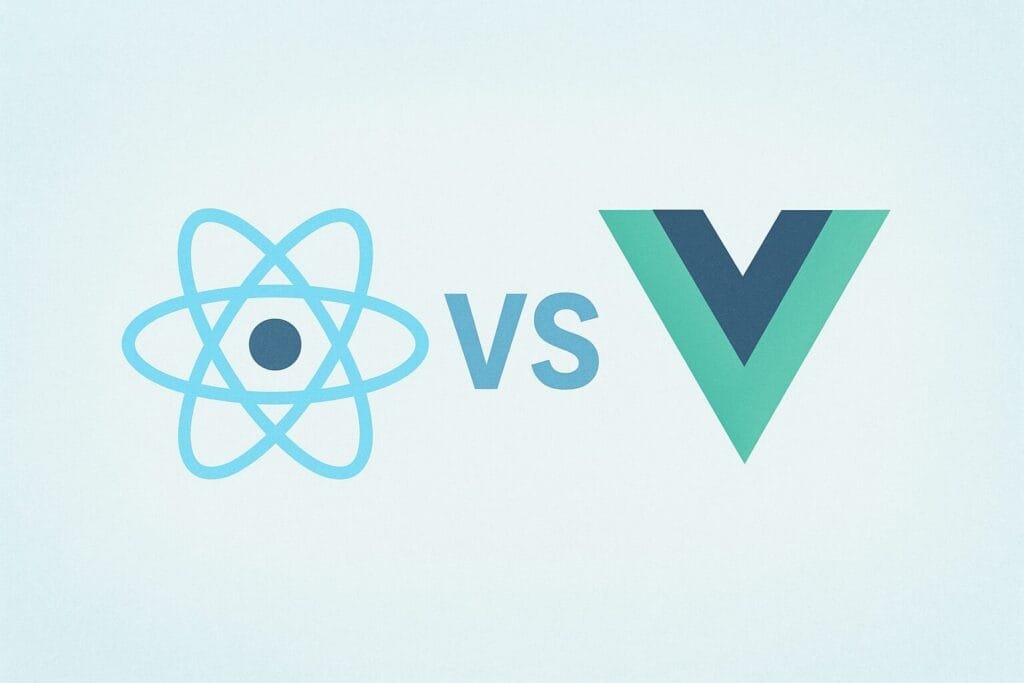In 2025, developers continue to face one of the most popular debates in the front-end development world: React vs Vue. Both are powerful JavaScript frameworks used to build dynamic and interactive web applications. But if you are just starting your journey as a front-end developer or looking to upgrade your skills, you might be wondering: which one should you learn in 2025?
In this article, we will provide a detailed comparison of React and Vue, their features, pros and cons, community support, job opportunities, and performance benchmarks. By the end, you will have a clearer idea of which framework is the better choice for you this year.

What is React?
React, created by Facebook (now Meta), is a JavaScript library for building user interfaces. It focuses on building UI components and is widely used by top companies like Netflix, Instagram, and WhatsApp. React’s ecosystem is massive, supported by tools like Next.js, React Native, and a large developer community.
What is Vue?
Vue is an open-source JavaScript framework created by Evan You. It has gained popularity because of its simplicity, flexibility, and beginner-friendly syntax. Vue is used by companies such as Alibaba, Xiaomi, and GitLab. Vue’s core strength is its lightweight design and easy learning curve, making it a favorite for small to medium projects.
React vs Vue: Feature Comparison
| Criteria | React | Vue |
|---|---|---|
| Learning Curve | Moderate, requires JSX understanding | Beginner-friendly, simple syntax |
| Performance | High, with Virtual DOM optimization | High, also uses Virtual DOM |
| Community Support | Massive global community, more resources | Smaller but growing and dedicated community |
| Ecosystem | Strong, supported by Next.js and React Native | Good, supported by Nuxt.js and Vue Native |
| Scalability | Excellent for enterprise-level applications | Great for small to medium projects |
| Job Market | Very high demand in startups and enterprises | Moderate demand, increasing steadily |
Why Choose React in 2025?
- Massive Job Opportunities: React is still the leader in job postings worldwide.
- Enterprise-Level Use: Ideal for large-scale applications requiring scalability.
- Rich Ecosystem: React Native for mobile apps and Next.js for SSR apps.
- Strong Backing: Supported by Meta and global developer communities.
Why Choose Vue in 2025?
- Beginner-Friendly: Easier for newcomers to pick up quickly.
- Lightweight Framework: Faster prototyping and smaller bundle sizes.
- Nuxt.js Power: Vue’s counterpart to Next.js for server-side rendering.
- Rising Popularity: Growing adoption in Asia and Europe.
Performance Benchmarks
Both React and Vue use Virtual DOM, ensuring smooth performance. However, benchmarks suggest that Vue can sometimes outperform React in small projects due to its lightweight design, while React shows better scalability in enterprise-level projects.
Community and Ecosystem
React’s ecosystem is unmatched. With thousands of libraries, tools, and tutorials, React dominates the global front-end landscape. Vue, however, is catching up with its elegant ecosystem led by Nuxt.js. If you want a beginner-friendly start, Vue might be easier, while React’s community ensures long-term support and job security.
Job Market in 2025
The job market in 2025 shows React still dominates in terms of global job postings, especially in North America, Europe, and India. Vue is growing in Asia and Europe but does not yet match React’s demand. For developers aiming at career opportunities, React remains the safer bet.
External Resources
If you want to check the latest trends in React and Vue popularity, you can visit NPM Trends comparison for live download statistics.
Conclusion: Which One Should You Learn in 2025?
If you are looking for job opportunities, scalability, and enterprise-level projects, React is the framework to learn in 2025. However, if you want ease of learning, lightweight applications, and rapid prototyping, Vue is an excellent choice. Ultimately, your decision should depend on your career goals and the type of projects you want to work on.
React vs Vue in 2025 is not about which is better overall, but which aligns better with your personal goals as a developer.

